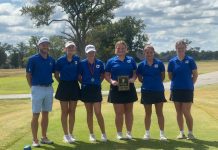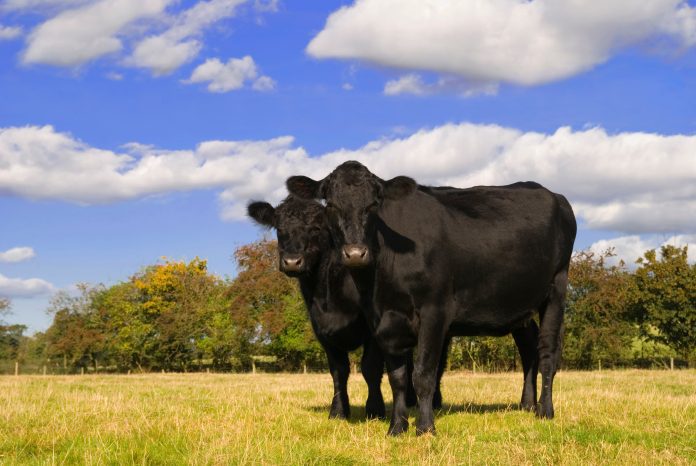CARTHAGE, Mo. — “The Missouri Show Me Select (SMS) Replacement Heifer Program educates cattle producers on heifer development strategies in the areas of management, reproduction and genetics to create a reliable source of quality replacement heifers,” says Patrick Davis MU Extension Livestock Field Specialist. Throughout the year a portion of the heifers developed through this program are sold in various sales throughout the state. On November 18th at 7:00 p.m. the Southwest Missouri Show Me Select Replacement Heifer Program Sale will be at Joplin Regional Stockyards (JRS) near Carthage, Mo. Approximately 150 spring calving (February to April) SMS Certified bred heifers will be offered for sale. There are 11 consigners to this sale with 1 of them selling heifers for the first time.
“Heifer breeds represented in this sale include Herefords, Angus, Gelbvieh, Red Angus, SimAugus and Balancer,” says Davis. The heifers at the JRS Sale are purebred or crossbred commercial heifers that are primarily black and black white face with approximately 30% being red. Majority of the heifers are crossbreds, providing them with a production boost from hybrid vigor. Research consistently shows crossbred females have more longevity, providing one extra calf in their lifetime compared to a purebred cow.
“Physical and reproductive soundness in the program heifers is highly scrutinized to develop a female that will have a long productive life in the buyer’s cattle operation,” says Davis. Consigners, veterinarians and MU Extension livestock field specialists have worked together to evaluate heifers and make sure they have met minimum standards for reproductive soundness, pelvic area, body condition score, weight and are free of blemishes. For more information on how these heifers are evaluated refer to MU Extension guide sheet G2093 “Screening Criteria for Show-Me-Select Replacement Heifers.” Heifers are further evaluated the day before the sale by US Department of Agriculture and/or Missouri Department of Agriculture graders and unsuitable heifers are removed from the sale. According to Davis, “Utilizing the protocols and guidelines of the SMS program is a sound strategy to ensure the right females are recruited for the breeding herd and they are managed appropriately, and that helps provide peace of mind during the calving season.”
“Program heifers are bred to bulls that have met strict calving ease direct (CED) expected progeny difference (EPD) requirements,” says Davis. This improves the likelihood that these females will calve unassisted, a trait that is important for cattle herd productivity and profitability. Davis urges cattle producers to utilize EPD technology as well as bulls that have satisfied the strict CED requirements when breeding replacement females, which should lead to more live calves promoting optimum herd production and profitability.
“SMS heifers have followed strict immunization and testing protocols to reduce disease and sickness spread to a buyer’s cattle operation,” says Davis. Heifers have had a brucellosis calfhood vaccination, tested negative for BVD-PI, and vaccinated as well as boostered for viruses like IBR, PI-3, BVD, BRSV, clostridia, leptospirosis, and vibriosis. Heifers were also treated for internal and external parasites. Davis urges cattle producers to incorporate veterinarian strategies to develop a cattle vaccination schedule to promote optimum health and protection against sickness and parasites leading to optimum operation performance and profitability.
“Local SMS certified herd veterinarians have conducted pregnancy examinations multiple times throughout the program to accurately predict heifer calving date,” says Davis. Heifers are evaluated within 90 days of being bred to determine the initial pregnancy. “This is the best time to accurately determine the stage of pregnancy and more accurately determine when that calf will be born. Furthermore, producers want this information because it helps them have proper protocols and labor available at calving time in case issues arise and females need assistance at calving,” says Davis. Heifers are pregnancy examined again within 30 days of the sale in order to confirm the female is pregnant at sale time. Beyond sale date, heifers are guaranteed to remain bred for at least 30 days after the sale. Although not part of the requirements, sellers often stand behind their product and work with buyers should an unexpected circumstance arise beyond the stated guarantee.
For more information on how to view sale lots online, visit the Joplin Regional Stockyards website at www.joplinstockyards.com or contact the stockyards at (417) 548-2333. Additional information on the heifers consigned to the sale and the Missouri SMS Replacement Heifer Program can be obtained by contacting Patrick Davis at (417) 276-3313 or by email at [email protected] or Andy McCorkill at (417) 345-7551 or by email at [email protected]. Missouri SMS Replacement Heifer Development Program information can be found at https://extension.missouri.edu/programs/show-me-select-replacement-heifer-program.















